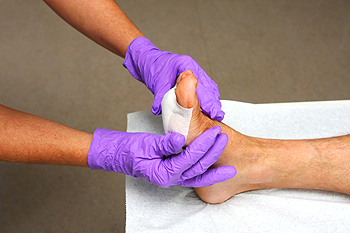
When a cut or sore on the foot lingers without getting better, it may be a sign of an underlying issue. Poor circulation can limit blood flow, slowing down the delivery of oxygen and nutrients needed for repair. Diabetes is another common factor, as high blood sugar often interferes with healing and raises the risk of infection. Sometimes, wounds fail to improve because of constant pressure or rubbing from footwear, which keeps reopening the skin. Nerve damage may also play a role, as people may not feel the injury worsening. In addition, not caring for the wound properly at the start, such as failing to clean it, cover it, or watch for signs of infection, can make recovery much harder. Delaying care for a non-healing wound can lead to serious complications. If you have a foot wound that is not improving, it is suggested that you see a podiatrist for an evaluation and appropriate treatment.
Wound care is an important part in dealing with diabetes. If you have diabetes and a foot wound or would like more information about wound care for diabetics, consult with Mark Isenberg, DPM from Center for Podiatric Excellence. Our doctor will assess your condition and provide you with quality foot and ankle treatment.
What Is Wound Care?
Wound care is the practice of taking proper care of a wound. This can range from the smallest to the largest of wounds. While everyone can benefit from proper wound care, it is much more important for diabetics. Diabetics often suffer from poor blood circulation which causes wounds to heal much slower than they would in a non-diabetic.
What Is the Importance of Wound Care?
While it may not seem apparent with small ulcers on the foot, for diabetics, any size ulcer can become infected. Diabetics often also suffer from neuropathy, or nerve loss. This means they might not even feel when they have an ulcer on their foot. If the wound becomes severely infected, amputation may be necessary. Therefore, it is of the upmost importance to properly care for any and all foot wounds.
How to Care for Wounds
The best way to care for foot wounds is to prevent them. For diabetics, this means daily inspections of the feet for any signs of abnormalities or ulcers. It is also recommended to see a podiatrist several times a year for a foot inspection. If you do have an ulcer, run the wound under water to clear dirt from the wound; then apply antibiotic ointment to the wound and cover with a bandage. Bandages should be changed daily and keeping pressure off the wound is smart. It is advised to see a podiatrist, who can keep an eye on it.
If you have any questions please contact our office located in Pensacola, FL . We offer the newest diagnostic and treatment technologies for all your foot and ankle needs.
